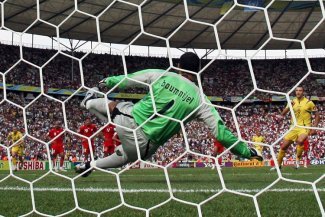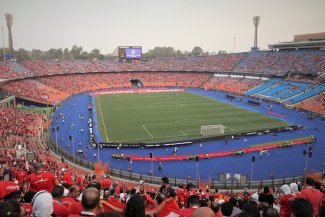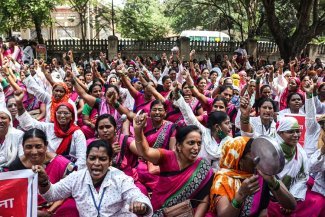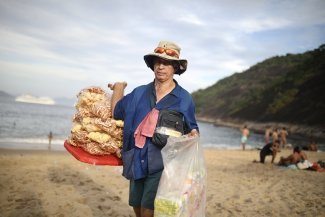FIFA recently announced that it would suspend Russia from the 2022 World Cup, responding to soccer fans and human rights groups outraged over Russia’s brutal and unprovoked invasion of Ukraine. As players from the US and around the world prepare for the 2022 World Cup in Qatar, FIFA must improve its track record of turning a blind eye to authoritarians and ‘sportswashing’ human rights violations.
Increasingly the new normal is for international mega sporting events to partner with authoritarian regimes while workers, local communities and marginalised groups suffer. In Qatar, thousands of migrant workers have died preparing for the 2022 World Cup. The Chinese government used the 2022 Olympics opening ceremony to thumb their nose at critics of their well-documented persecution of the Uyghur people. Exploitation of workers and local communities also marred the World Cups in Brazil and Russia.
In 2026, the United States, Canada and Mexico will host the FIFA World Cup. The 2026 World Cup will be a crucial opportunity for a group of democracies to set a new standard for international mega sporting events. Our countries have a chance to demonstrate what makes democracies different to a world awash with emboldened autocracies. Doing so will come down to protecting human rights and ensuring that workers and local communities actually benefit from the tournament. It will come down to getting FIFA to start doing things differently.
So far, the governing body has been reluctant to do so, as it nears the end of its host city selection process for the 2026 tournament. FIFA has refused calls from our coalition – made up of unions, worker and immigrant advocates, human rights organisations and fan groups – to adopt a set of minimum standards concerning key human and worker rights issues for prospective host cities and for itself.
While the 2026 World Cup is almost five years away, the human rights commitments of host cities are being framed and finalised now. FIFA required that the bid committees for each of the 17 prospective host cities submit a human rights plan, and while some took steps to engage labour and human rights stakeholders and integrate feedback, others neglected or outright refused to do so. This inconsistency and inadequate consideration of stakeholders is the result of FIFA’s failure to set clear standards and expectations around labour and human rights.
By requiring bid cities to provide human rights plans without setting clear minimum standards, FIFA is able to pay lip service to human rights while avoiding actually committing itself to selecting cities that prioritise human rights. This has, in turn, fostered a race to the bottom among bid cities.
Based on the human rights plans cities have submitted, it seems many think they can get away with simply avoiding human trafficking and forced labour. But the United States, Canada and Mexico are not Qatar – all three countries have higher standards thanks to our democratic systems and organised labour movements. We need to ensure the 2026 World Cup reflects that. Otherwise, FIFA and its corporate partners stand to profit from low wages, unsafe working conditions, racial discrimination in hiring and promotion, gentrification, and other forms of skewed development.
That’s why FIFA must adopt a minimum set of standards on human and labour rights for its own operations and require the cities hosting the games to commit to them as well. Those minimum standards should include (but not be limited to): fair living wages; strong workplace health and safety protections; targeted local hiring; limitations on temporary work; strong investigation and enforcement mechanisms; responsible contractor bid requirements; requirements to reduce labour conflict; and agreements to give workers a voice.
The buck stops with FIFA. Unless they explicitly set minimum standards, anything goes and most cities will look to cut corners. The inconsistencies across bid city proposals are a red flag that FIFA is on track to once again deprioritise human and labour rights at the World Cup. And if FIFA won’t take the necessary steps itself, then policymakers in the US, Canada and Mexico should hold FIFA accountable.
President Joe Biden responded to Russia’s invasion of Ukraine with a call to action for democracies and supporters of democratic values around the world. The risks presented by an international mega sporting event are of course not the same as those presented by an armed conflict. But just as the rise of President Vladimir Putin and other authoritarians around the world has seen them leverage the World Cup to demonstrate and bolster their soft power, so too should the mobilisation of democracies in response to the growing threat of autocratic regimes include efforts to leverage the World Cup to show why democratic values are better. 2026 is our chance to do that.












